Stepping Out of My Comfort Zone: Relocating from Introvert to Ambivert through Service by Raymond Knight
“One can choose to go back toward safety or forward toward growth. Growth must be chosen again and again; fear must be overcome again and again.” -Abraham Maslow
The year 2019 saw me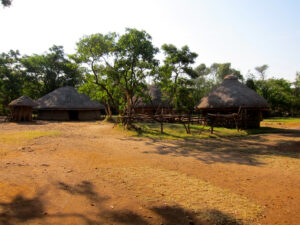 preparing myself to live in a Kenyan village for two years, teaching sign language and life skills to deaf Kenyan youth. That was the plan anyway, but COVID-19 saw to it that, that particular reality would not take place. Fortunately, I recalled bookmarking several favorite opportunity listings in the My AmeriCorps Portal. I began looking through them for assignments that interested, inspired, or challenged me—offering opportunities for personal and professional growth. After a while I came across Montana Campus Compact and was excited by the opportunity to serve within a small, bucolic community. So, off to Montana I went.
preparing myself to live in a Kenyan village for two years, teaching sign language and life skills to deaf Kenyan youth. That was the plan anyway, but COVID-19 saw to it that, that particular reality would not take place. Fortunately, I recalled bookmarking several favorite opportunity listings in the My AmeriCorps Portal. I began looking through them for assignments that interested, inspired, or challenged me—offering opportunities for personal and professional growth. After a while I came across Montana Campus Compact and was excited by the opportunity to serve within a small, bucolic community. So, off to Montana I went.
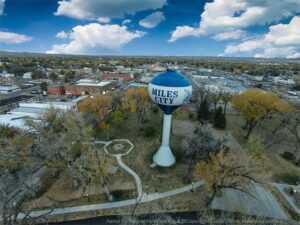 What I had not anticipated when relocating to Montana was the culture shock associated with uprooting myself from everything that was familiar, predictable, and therefore comfortable. Initially, I felt cut off from familiar personal behavioral cues, as if my own values were being brought into question, and like I didn’t know the rules. It was at this point that I realized that, apart from experiencing some culture shock, I was still living in my very own personalized version of a comfort zone, which I had come to label introversion. I was surprised by this awakening because I thought I had successfully dealt with this issue years ago.
What I had not anticipated when relocating to Montana was the culture shock associated with uprooting myself from everything that was familiar, predictable, and therefore comfortable. Initially, I felt cut off from familiar personal behavioral cues, as if my own values were being brought into question, and like I didn’t know the rules. It was at this point that I realized that, apart from experiencing some culture shock, I was still living in my very own personalized version of a comfort zone, which I had come to label introversion. I was surprised by this awakening because I thought I had successfully dealt with this issue years ago.
Upon further reflection, I realized that the self-fulfilling prophecy within this label was the driving force behind the establishment and maintenance of my comfort zone down through the years. It was the ultimate psychological circular argument, a psychological one-upmanship where my own belief in this label led to corresponding perceptions, supportive expectations (largely self-generated), and affirming reactions or behaviors.
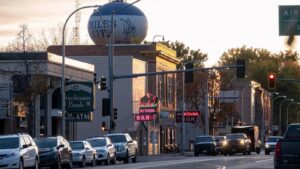 The obvious question I found myself considering in all of its aspects was, is this zone really comfortable, beneficial, or even worth having as a part of my life? I have observed that comfort, among other things, actually kills creativity, innovation, activity, and productivity. It actually serves as a personal growth inhibitor rendering you “safe” but devoid of spontaneity, passion, direction, excitement, and opportunities for greater gains or advancements. What an awful price to pay for “security.” So, given these observations, I decided to undertake this project of self-discovery, awareness, and improvement. However, before I got started, I wanted to know exactly what the comfort zone was and what I was going up against.
The obvious question I found myself considering in all of its aspects was, is this zone really comfortable, beneficial, or even worth having as a part of my life? I have observed that comfort, among other things, actually kills creativity, innovation, activity, and productivity. It actually serves as a personal growth inhibitor rendering you “safe” but devoid of spontaneity, passion, direction, excitement, and opportunities for greater gains or advancements. What an awful price to pay for “security.” So, given these observations, I decided to undertake this project of self-discovery, awareness, and improvement. However, before I got started, I wanted to know exactly what the comfort zone was and what I was going up against.
Just what is a comfort zone? According to my research, a comfort zone is our naturally occurring practice of forming a “behavioral or mental space, where our activities and behaviors fit inside a nice steady routine and pattern which minimizes risk, anxiety, and stress.” Research supports the notion that the comfort zone is designed to provide us with relative safety within a “anxiety-neutral” position where our “assumptions, determination, and abilities are not being routinely tested,” rendering us “at ease” and with the perception that we are in control of our environment,” according to an article from Cambridge University.
The Anatomy of the Comfort Zone.
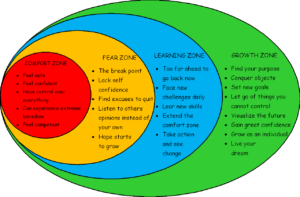 The Fear Zone: The toughest hurdle to cross. It represents a state of fear and uncertainty surrounding our need to suddenly change from a steady comfortable place to one mired in discomfort, uncertainty, and heightened stress and anxiety. Without a clear roadmap, there’s no way to build on previous experiences. This can be anxiety-provoking. Yet persevere long enough, and you enter the learning zone, where you gain new skills and deal with challenges resourcefully.
The Fear Zone: The toughest hurdle to cross. It represents a state of fear and uncertainty surrounding our need to suddenly change from a steady comfortable place to one mired in discomfort, uncertainty, and heightened stress and anxiety. Without a clear roadmap, there’s no way to build on previous experiences. This can be anxiety-provoking. Yet persevere long enough, and you enter the learning zone, where you gain new skills and deal with challenges resourcefully.
The Learning Zone: In order to begin to experience some relief from that fear, we need to move farther out of our comfort zone. The Learning Zone is the place we are far enough out of our comfort zone that our anxiety levels become more productive, we begin to learn new things, and are able to put that energy to good use.
The Growth Zone: As we move further away from our comfort zone, things start to look less familiar and we are challenged to create innovative ways to address new and unfamiliar issues. This is where it is all new territory, and we are able to set and act toward new goals and dreams. The growth mindset expands the possible. It inspires us to learn and take healthy risks, leading to positive outcomes across life domains. Source: Karen Gray.
Research suggests that in the end, the comfort zone is neither inherently good or bad. At best it’s a composite of each in varying degrees, depending on specific circumstances. It provides us with a seemingly endless stream of desirable, predictable, and expected outcomes. So, if this is a naturally occurring practice or mental creation which makes us feel safe and in control, why change it?
One basic motivation lies in the realization that our individual environments and/or even the world at large are not necessarily safe and/or predictable spaces. Life itself is rarely risk-free or predictable. Life itself makes demands of us. What happens if you need or are being forced to make a change? What then? What about the opportunity costs of residing in one’s comfort zone and sacrificing countless opportunities to try or learn something new, gain new skills or abilities, or for further growth and development, etc., for this “safety and security?” How does remaining in our comfort zone serve us under these conditions? The short answer is that it doesn’t.
Admittedly, after considering all of this information, I was left wondering how do I overcome this long-term, costly habit? Like most people, my natural tendency is not to poke the bear. I mean, who deliberately gives up comfort and intentionally invites more stress and anxiety into their lives? This is an age-old argument, a back and forth discussion or debate that I could continue having with myself until the cows come home (which, admittedly wouldn’t give me a lot of contemplative time since from my dorm window, I can actually see when the cows come home), so I asked myself, am I willing to “do the work” needed to avoid the habit of falling into the trap of my comfort zone—trading “safety” for the rewards that come with facing my fears, pushing myself towards greater success, taking on new challenges, and risking rejection, failure, or even looking foolish?
From Comfort Zone to Growth Zone.
“Coming out of your comfort zone is tough in the beginning, chaotic in the middle, and awesome in the end … because in the end, it shows you a whole new world.” -Manoj Arora
Getting back to my original question: is this zone really comfortable, beneficial, or even worth having as a part of my life? My answer was/is NO. To my other question, am I willing to “do the work” needed to avoid the habit of falling into the trap of my comfort zone—trading “safety” for the rewards that come with facing my fears, pushing myself towards greater success, taking on new challenges, and risking rejection, failure, or even looking foolish? My answer was/is YES. As such, I saddled up because I was about to embark on an exciting journey of self-discovery and evolution traveling through another dimension—a dimension not only of sight and sound but of mind. A journey into a wondrous land whose boundaries are that of imagination. That’s a signpost up ahead—your next stop:
The Growth Zone!
The work which proceeds personal growth in this area involves me being vigilant when it comes to recognizing old familiar diminutive thoughts, imaginings, and patterns of disasterizing or worst-case scenario generation. My goal is to develop a stronger sense of awareness when it comes to recognizing and addressing/challenging/shedding old familiar introverted impulses, tendencies, and/or practices which no longer serve me.
Ultimately, my journey of self-awareness is all about re-discovering myself from a new point of view. However, my destination is not to become an extrovert. As a work in progress, I am not going to force myself to live a life which is the exact opposite of how I have been living. My personal evolutionary mission is to take baby steps acknowledging some introverted aspects of my personality but integrating them with more extroverted aspects—in short, to practice and become more of an ambivert (a person whose personality falls between the extrovert and introvert extremes).
The practice of “doing the work” is an ongoing process. So far, while engaged in this period of self-reflection, I realized although I am serving others as a change agent, confronting myself in a bid for personal change has proven to be more challenging. I recognized few people are aware of a need to change for the better, to say nothing of actually being motivated to do the things they need to do.
Generally speaking, fear serves a noble purpose protecting us from impending danger or actual harm. It works towards assuring our overall survival. However, as it relates to our comfort zone, fear is a liar that must be confronted and/or challenged every time it arises. It tends to distort and make situations appear far worse than they actually are. When combined with an active imagination, fear creates a version of a perceived threat or situation as being more threatening or much bigger than the actual reality of them. Often, on the other side of that fear is freedom, exhilaration, relief, joy, greater insight, understanding, and opportunities to achieve and make positive contributions.
An integral part of my self-care program involved routinely abandoning my comfort zone (by doing something, within reason, that scared me, or at the very least, made me a little uncomfortable each day), by being present, confronting and conquering my fears, and making tough, deliberate but ultimately beneficial daily choices in order to show up in service as a greater version of myself and a greater benefit to the community I serve. What’s the alternative? Simply continuing to hide out in my comfort zone hampers my efforts to achieve, sabotages my overall performance and outcomes, reduces the quality of my service or interaction with myself and others, and deprives me of opportunities to try new things (some of which I might actually enjoy).
Some of the benefits of this new way of being include opportunities for increased happiness and life fulfillment, a lifetime of personal growth, development, and general learning opportunities, enhanced confidence, increased flexibility, antifragility, resiliency, adaptability, a more positive impact on those I interact with, and contribution and legacy.
Contribution and Legacy.
Legacy: Year 1. Outside of being invited to serve in Montana, and actually providing useful, life-changing services, the accomplishment that I am most proud of is the concept of having a service legacy. I am proud of the fact that my service here can now be seen as the assignment which opened the door for AmeriCorps members to serve on the Miles Community College campus. This is a pivotal moment since a Montana Campus Compact AmeriCorps College Coach began serving in Miles City and coordinating service projects for the September 11 National Day of Service and Remembrance, Dr. Martin Luther King Jr. National Day of Service, and Global Youth Service Day for the first time in the history of this small town. My service was a catalyst for the successful founding of a campus career center which serves rural, often distressed, first-generation, nontraditional, and international high school and college students. I also launched the center’s eponymous biannual newsletter. In addition, my service was the first time many students and locals had a chance to meet and interact closely with a professional who just happens to be a Black man.
Serving Miles Community College.
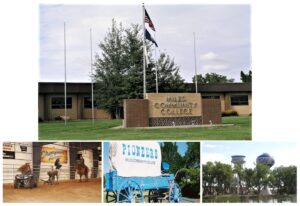 Miles Community College (MCC), located in Miles City, was founded in 1939. However, for nearly 20 years it operated out of a few rooms in the local public high school. In 1967, MCC moved into a new building that was constructed after passage of a bond issued by county voters.
Miles Community College (MCC), located in Miles City, was founded in 1939. However, for nearly 20 years it operated out of a few rooms in the local public high school. In 1967, MCC moved into a new building that was constructed after passage of a bond issued by county voters.
Miles City is the county seat of Custer County, Montana, which has a population of 8,354 according to the 2020 census. With its racial makeup reported as 95.3% White, 1.7% Native American, 1.6% from two or more races, 0.7% Pacific Islander and from other races, 0.4% Asian, and 0.3% African American, I couldn’t think of a better, more challenging place to serve when it came to the practices of seeking as well as providing understanding, searching for common ground, getting things done, and growing as an individual.
Being here offers so many opportunities for me to learn while interacting with locals and sharing stories from my large, East Coast-bred, synthetic, hyperactive, urbanized culture with individuals from a small, westernized, organic, ruggedly individualistic, subdued, and somewhat xenophobic bucolic town culture.
Ultimately, being here allows me to shatter stereotypes, while making positive contributions to situations in need of direct intervention and/or improvement.
Service Legacy Pt. 1: The Career Services Center

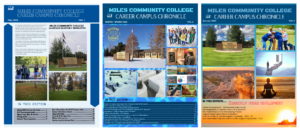
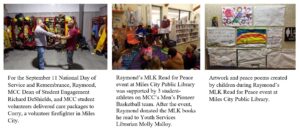

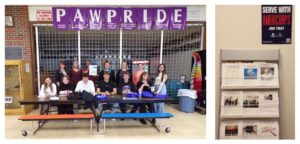
Recognized and Honored.
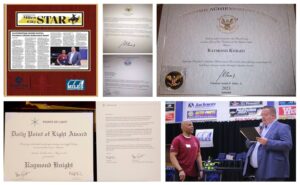
Life Goes on Without Me.
The Tao of Personal Growth Through Service.
Why is helping people, actively becoming part of the solution, and working to make the world a better place through service important to me? It wasn’t always. I worked both in corporate America as well as the nonprofit sector. I was a different person back then. Like everyone else, I’d watch the news and see things that needed to be done to address local or global issues (e.g., food insecurity, intergenerational poverty, gender-based violence, outrageous illiteracy rates, substance abuse, high infant mortality rates, etc.), but just complain about it or simply sit back and ask, “When is somebody going to do something about that?” Yes. That used to be me!
After a while, it became clear. The question that I should have been asking was, why can’t that “somebody” be me? Over time, I began to notice how much better I felt while serving the community, as opposed to working a standard, corporate desk job, and I paid attention to that. A life in service seemed like the only viable way to affect positive change, in some small way, to the world around me. This mission is important to me because I know that things will only get better if we collectively “roll up our sleeves” and get directly involved in producing the changes that we want to see in our communities and the world as a whole.
This personal development journey of mine is an ongoing process of self-awareness, self-improvement, and overall personal growth. The benefits I have been reaping so far include learning more about myself, learning about becoming more comfortable with discomfort and uncertainty, more about empathy and forgiveness, how to manage stress more effectively, and learning new skills in general.
The benefits just keep coming, ranging from smiles to the stunning transformations I witness in the community I am serving. It’s personally rewarding to see area residents collaborating to rebuild their careers, health, lives, families, and/or communities. Even as I make positive contributions while serving others, the act of serving itself has been personally satisfying and transformational, allowing me to become a better person with a deeper level of respect for other people’s points of view and better levels of self, situational, and conditional awareness as it pertains to my person, my role, and the bucolic needs of the community at large—needs which have historically existed outside of my perceptual range of experience.
None of this would have been possible without me becoming actively involved through service. In the absence of involvement, life goes on without me!
Finally, let it be said that it takes a great deal of bravery and confidence to voluntarily immerse oneself in cultural or other experiences outside of their own. Second, it takes sheer courage, i.e., having fear, being mindful of the risks but consciously deciding to take them anyway, to commit one or more years of one’s life outside of their comfort zone while serving others in a different city or state, away from the comforts of the familiar, and I respect that. I use this space to acknowledge, congratulate, and honor all who do so.
 Blog
Blog